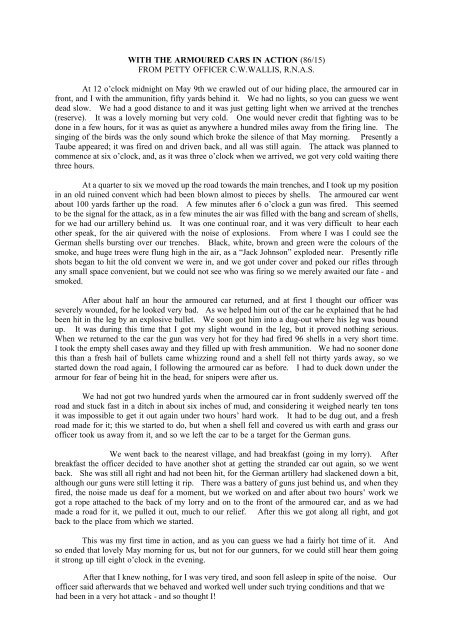World War I Roll of Honour - The Clove Club Hackney Downs School
World War I Roll of Honour - The Clove Club Hackney Downs School
World War I Roll of Honour - The Clove Club Hackney Downs School
Create successful ePaper yourself
Turn your PDF publications into a flip-book with our unique Google optimized e-Paper software.
WITH THE ARMOURED CARS IN ACTION (86/15)<br />
FROM PETTY OFFICER C.W.WALLIS, R.N.A.S.<br />
At 12 o’clock midnight on May 9th we crawled out <strong>of</strong> our hiding place, the armoured car in<br />
front, and I with the ammunition, fifty yards behind it. We had no lights, so you can guess we went<br />
dead slow. We had a good distance to and it was just getting light when we arrived at the trenches<br />
(reserve). It was a lovely morning but very cold. One would never credit that fighting was to be<br />
done in a few hours, for it was as quiet as anywhere a hundred miles away from the firing line. <strong>The</strong><br />
singing <strong>of</strong> the birds was the only sound which broke the silence <strong>of</strong> that May morning. Presently a<br />
Taube appeared; it was fired on and driven back, and all was still again. <strong>The</strong> attack was planned to<br />
commence at six o’clock, and, as it was three o’clock when we arrived, we got very cold waiting there<br />
three hours.<br />
At a quarter to six we moved up the road towards the main trenches, and I took up my position<br />
in an old ruined convent which had been blown almost to pieces by shells. <strong>The</strong> armoured car went<br />
about 100 yards farther up the road. A few minutes after 6 o’clock a gun was fired. This seemed<br />
to be the signal for the attack, as in a few minutes the air was filled with the bang and scream <strong>of</strong> shells,<br />
for we had our artillery behind us. It was one continual roar, and it was very difficult to hear each<br />
other speak, for the air quivered with the noise <strong>of</strong> explosions. From where I was I could see the<br />
German shells bursting over our trenches. Black, white, brown and green were the colours <strong>of</strong> the<br />
smoke, and huge trees were flung high in the air, as a “Jack Johnson” exploded near. Presently rifle<br />
shots began to hit the old convent we were in, and we got under cover and poked our rifles through<br />
any small space convenient, but we could not see who was firing so we merely awaited our fate - and<br />
smoked.<br />
After about half an hour the armoured car returned, and at first I thought our <strong>of</strong>ficer was<br />
severely wounded, for he looked very bad. As we helped him out <strong>of</strong> the car he explained that he had<br />
been hit in the leg by an explosive bullet. We soon got him into a dug-out where his leg was bound<br />
up. It was during this time that I got my slight wound in the leg, but it proved nothing serious.<br />
When we returned to the car the gun was very hot for they had fired 96 shells in a very short time.<br />
I took the empty shell cases away and they filled up with fresh ammunition. We had no sooner done<br />
this than a fresh hail <strong>of</strong> bullets came whizzing round and a shell fell not thirty yards away, so we<br />
started down the road again, I following the armoured car as before. I had to duck down under the<br />
armour for fear <strong>of</strong> being hit in the head, for snipers were after us.<br />
We had not got two hundred yards when the armoured car in front suddenly swerved <strong>of</strong>f the<br />
road and stuck fast in a ditch in about six inches <strong>of</strong> mud, and considering it weighed nearly ten tons<br />
it was impossible to get it out again under two hours’ hard work. It had to be dug out, and a fresh<br />
road made for it; this we started to do, but when a shell fell and covered us with earth and grass our<br />
<strong>of</strong>ficer took us away from it, and so we left the car to be a target for the German guns.<br />
We went back to the nearest village, and had breakfast (going in my lorry). After<br />
breakfast the <strong>of</strong>ficer decided to have another shot at getting the stranded car out again, so we went<br />
back. She was still all right and had not been hit, for the German artillery had slackened down a bit,<br />
although our guns were still letting it rip. <strong>The</strong>re was a battery <strong>of</strong> guns just behind us, and when they<br />
fired, the noise made us deaf for a moment, but we worked on and after about two hours’ work we<br />
got a rope attached to the back <strong>of</strong> my lorry and on to the front <strong>of</strong> the armoured car, and as we had<br />
made a road for it, we pulled it out, much to our relief. After this we got along all right, and got<br />
back to the place from which we started.<br />
This was my first time in action, and as you can guess we had a fairly hot time <strong>of</strong> it. And<br />
so ended that lovely May morning for us, but not for our gunners, for we could still hear them going<br />
it strong up till eight o’clock in the evening.<br />
After that I knew nothing, for I was very tired, and soon fell asleep in spite <strong>of</strong> the noise. Our<br />
<strong>of</strong>ficer said afterwards that we behaved and worked well under such trying conditions and that we<br />
had been in a very hot attack - and so thought I!


